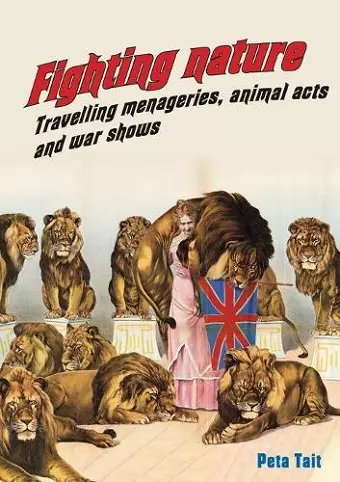Fighting Nature
Travelling Menageries, Animal Acts and War Shows
Professor Peta Tait author Fiona Probyn-Rapsey editor
Format:Paperback
Publisher:Sydney University Press
Published:10th Aug '16
Should be back in stock very soon

19th-century menageries reflected a human capacity for fighting, aggression and dominance over nature, and echoed a cultural fascination with war and colonial expansion. Their legacy embedded in society a belief in the human right to exploit other animal species – a belief yet to be defeated.
Throughout the 19th century, animals were integrated into staged scenarios of confrontation, ranging from lion acts in small cages to large-scale re-enactments of war. Initially presenting a handful of exotic animals, travelling menageries grew to contain multiple species in their thousands. These 19th-century menageries entrenched beliefs about the human right to exploit nature through war-like practices against other animal species. Animal shows became a stimulus for antisocial behaviour as locals taunted animals, caused fights, and even turned into violent mobs. Human societal problems were difficult to separate from issues of cruelty to animals.
Apart from reflecting human capacity for fighting and aggression, and the belief in human dominance over nature, these animal performances also echoed cultural fascination with conflict, war and colonial expansion, as the grand spectacles of imperial power reinforced state authority and enhanced public displays of nationhood and nationalistic evocations of colonial empires.
Fighting Nature is an insightful analysis of the historical legacy of 19th-century colonialism, war, animal acquisition and transportation. This legacy of entrenched beliefs about the human right to exploit other animal species is yet to be defeated.
'When does fighting end and theatre begin? In this fascinating study, Peta Tait – one of the most prominent authors in the Performance/Animal Studies intersection – explores animal acts with a particular focus on confrontation. The sites of the human–animal encounter range from theatres, circus, and war re-enactments investigating how the development of certain human fighting practices run in parallel with certain types of public exhibits of wild animals. Tait’s account is historical, looking at animal acts – from touring menageries to theatrical performances – from the 1820s to the 1910s.'
Lourdes Orozco, Lecturer in Theatre Studies, University of Leeds
‘The book is an enlightening read that provides a wealth of information about especially nineteenth-century animal performances. ... the overall interpretive frame, which also allows for a deeper understanding of the behaviours of the audience, is quite compelling.
The book is an important and timely contribution, especially as we watch the waning days of the 146-year-old tradition behind the Ringling Brothers and Barnum and Bailey Circus.’
-- Nigel Rothfels * Animal Studies Journ- Nominated for CHASS Australian Prize 2017 (Australia)
ISBN: 9781743324301
Dimensions: 210mm x 148mm x 16mm
Weight: 400g
254 pages